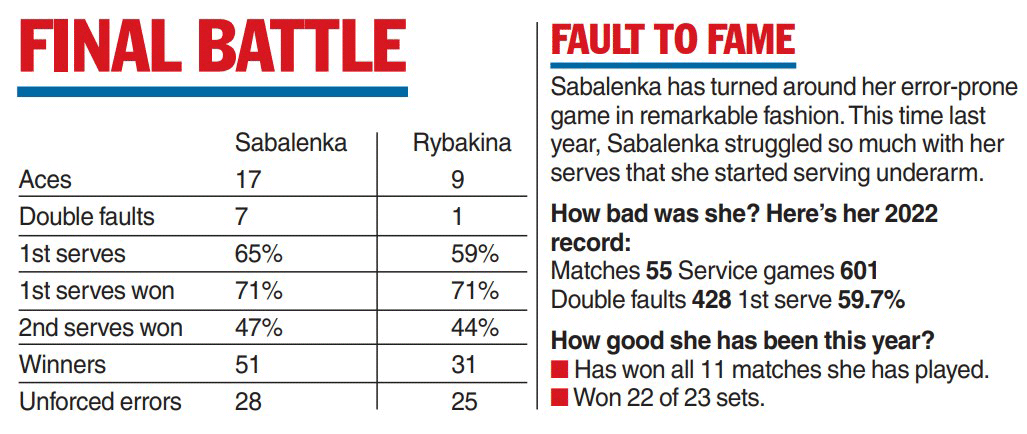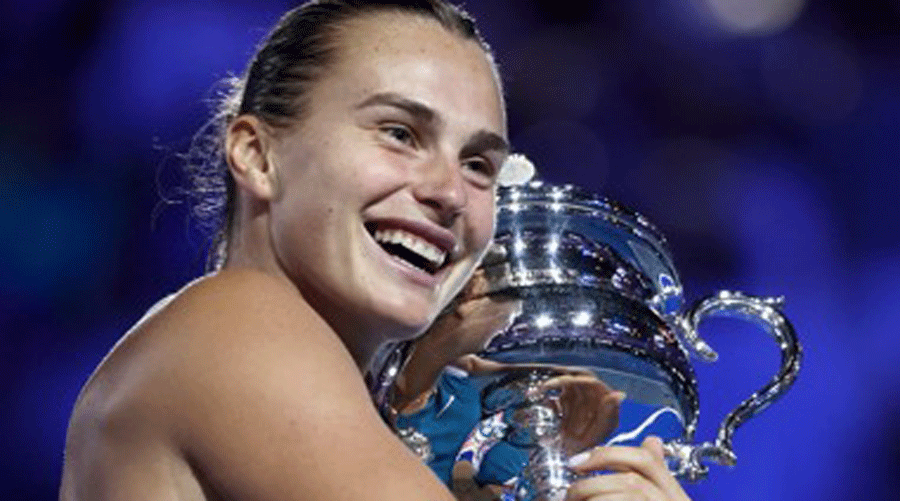Ayrna Sabalenka is no longer afraid of big stages.
Overcoming a history of buckling under the pressure of late-round grand slam tennis, Sabalenka, the powerful 24-year-old from Belarus, came from behind to beat Elena Rybakina of Kazakhstan 4-6, 6-3, 6-4 in the women’s singles final of the Australian Open on Saturday.
In a matchup of two of the biggest hitters in the sport, Sabalenka was a few clicks more clinical than Rybakina in the crucial moments to cap off a dominant summer of tennis in Australia. It was Sabalenka’s first grand slam title in a rocky career that has included the kind of error-ridden, big-moment meltdowns from which some players almost never recover.
Instead, the match proved a microcosm of Sabalenka’s career — a shaky start, filled with ill-timed double faults followed by a steadying midmatch recovery before a final-set display of raw power and precision that her opponent could not answer.
On the final, anxious point, Rybakina sent a forehand long. In an instant, Sabalenka was on her back on the blue court, crying tears of joy — and relief.
Holding the championship trophy on a stage a few minutes later, Sabalenka turned to her coaches and thanked them for sticking with her on an emotional ride to this first grand slam title.
“We’ve been through a lot of downs,” she said. “It’s more about you than it is about me.”
Hardly, of course, especially on a night when she had to overcome an opponent who had proven herself on a stage like this before.
Rybakina, a native Russian who became a citizen of Kazakhstan five years ago in exchange for financial support, was aiming to back up her championship run at Wimbledon and announce herself as the major threat in women’s tennis.
Instead it was Sabalenka who showed the mettle needed to survive the kind of highrisk, high-reward tennis battle that had seemed inevitable from the first days of a tournament in which the conditions were ideal for the biggest, flattest hitters.
When players first began arriving in Melbourne more than two weeks ago, they said the combination of heat, humidity and court preparation had made the balls difficult to spin, giving the edge to players who hammer their first serves and rips at nearly every rally ball as though they get extra credit for velocity.
That suited Rybakina and Sabalenka just fine, as they played with the silver champion’s trophy sparkling on a pedestal in the corner of the court, in case either of them tried to pretend this was just another match.

Entering the finals, Rybakina led the field with in aces with 45. Sabalenka was third with 29. They were first and second in hitting winners off their opponents’ serve, and at the top of the charts in peak serve speed, with both cracking 120 miles per hour.
Subtle, deft, tennis this was not, and for Rybakina it was so different from her championship match at Wimbledon in July, when she played Ons Jabeur of Tunisia, one of the most creative players in the game.
It was also different psychologically, and not only because she was doing something in Australia that she had already done before and that her opponent had not.
Sabalenka’s power is different than Rybakina’s, though. Both players are six feet tall, but Sabalenka swings a tennis racket like a lumberjack wields an axe, screaming with exertion on every stroke, every bit of struggle and emotion visible in her eyes, while Rybakina’s long arms make her seem like a human trebuchet, slinging shots in silence and giving no hint of the turmoil stirring inside.
As Sabalenka settled in and knotted the score, the match became a test of which brand of high-octane tennis could sustain the pressure of a final set for one of the biggest championships in the sport.
As the reigning Wimbledon champion playing against a first-time grand slam finalist, Rybakina held a priceless edge in experience, but Sabalenka had all of the momentum, and the balls were jumping off her strings with a pop and a zip that Rybakina couldn’t match.
On Thursday, after finally making her first grand slam final on her fourth try, Sabalenka talked about having fired her sports psychologist.
“Every time hoping that someone will fix my problem, it’s not fixing my problem,” she said. “I’m not working with a psychologist any more. I’m my psychologist.”
For one moment the old Sabalenka reappeared as she tried to serve out the match at 5-4. She aced Rybakina to get to her first match point, then double-faulted to let Rybakina back in. Then, on Sabalenka’s fourth match point, Rybakina buckled, sending that forehand long, and an overwhelmed Sabalenka flat onto her back.
Match over. Demons exorcised. And a new member of the sport’s most revered club.
New York Times News Service










